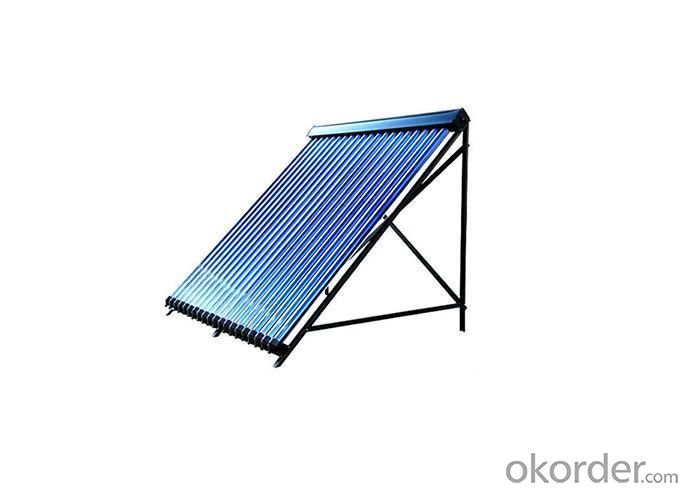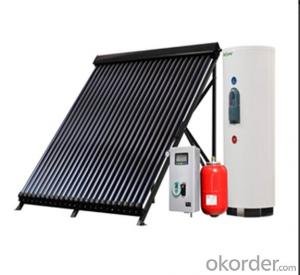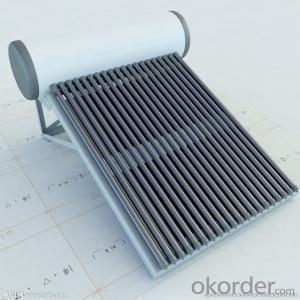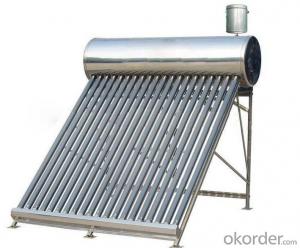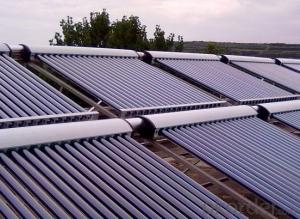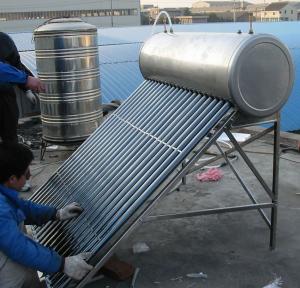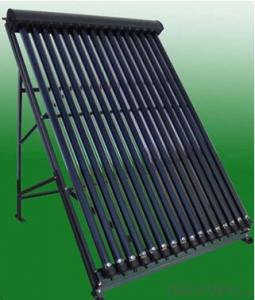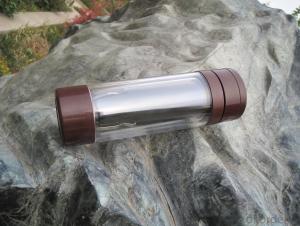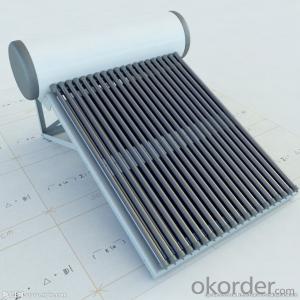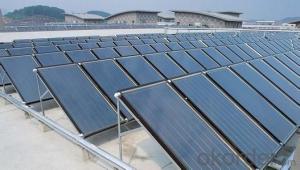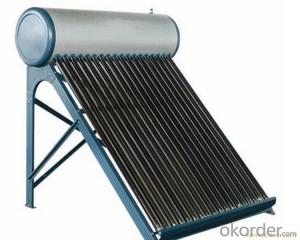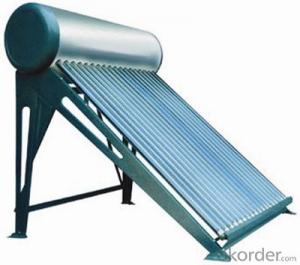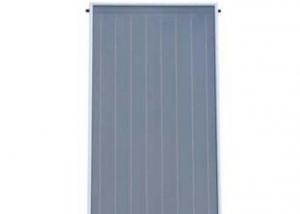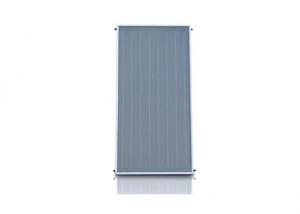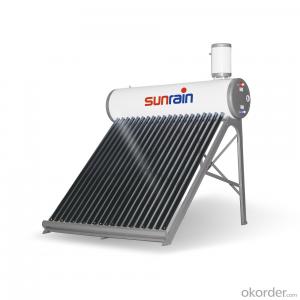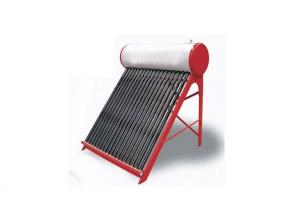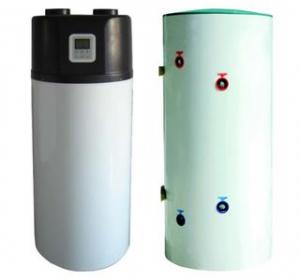100L Solar Water Heater
- Loading Port:
- China Main Port
- Payment Terms:
- TT or LC
- Min Order Qty:
- 1 Set set
- Supply Capability:
- 5000 Sets per Month set/month
OKorder Service Pledge
OKorder Financial Service
You Might Also Like
The separate pressurized solar water heater composes of solar collector, storage tank and controller.
Working principle
1) When the discrepant temperature of the solar collector and water tank reaches the set value, the controller shall start the circulation pump automatically.
2) The circulation pump makes heat-conducting liquid circulate automatically.
3) The heat-conducting liquid transfers heat to water by heat exchanger in the water tank.
4) In case the temperature of the water tank does not reach the T max, then start the auxiliary heating device.
5) If discrepant temperature of the collector and the water tank does not reach the set value, the circulation pump shall be shut automatically.
Characteristics
1) Collector separates with the storage tank. The tank can be put anywhere of the house
2) And the collector can be put on both tilted roof and flat roof
3) Module design, arbitrary combination, harmony with the building perfectly
4) Intelligent control and automatic operation
5) Anti-freeze: no water inside the tubes when it works
6) The system controller has the anti-freezing function is that the temperature circulation will operate while it reaches the fixed temperature
7) Multifunction: Bathing, washing, domestic heating
8) Workable at anytime and enjoyable
- Q: Why solar water heaters, hot and cold water temperature is not adjusted:
- We can choose CNC thermostatic instrument, digital temperature, input of shower water temperature, start 5 seconds can be directly shower, do not need to repeatedly adjust memory function is preferred.
- Q: How does the type of circulation system impact the performance of a solar water heater?
- The type of circulation system in a solar water heater can greatly impact its performance. A well-designed circulation system ensures efficient heat transfer, which is crucial for the overall effectiveness of the system. The circulation system helps to evenly distribute the heated water throughout the tank or piping, maximizing the solar energy absorption. It also aids in preventing stagnation and the formation of hotspots, which can negatively affect the system's efficiency. Therefore, a properly functioning circulation system is essential for optimizing the performance and effectiveness of a solar water heater.
- Q: What is the expected performance of a solar water heater in areas with high levels of snow?
- The expected performance of a solar water heater in areas with high levels of snow may be significantly reduced. Snow accumulation on the solar panels can limit their ability to absorb sunlight, resulting in decreased efficiency and lower water heating capacity. Additionally, snow cover can obstruct the circulation of water and impede the transfer of heat from the panels to the water. Therefore, it is important to consider alternative heating methods or implement snow removal strategies to ensure optimal performance in such snowy conditions.
- Q: How does the pipe diameter affect the performance of a solar water heater?
- The pipe diameter affects the performance of a solar water heater by influencing the flow rate and pressure of the water circulating through the system. A larger diameter pipe allows for a higher flow rate, which can improve the system's efficiency and reduce the time required to heat the water. On the other hand, a smaller diameter pipe can lead to increased resistance and pressure drop, potentially reducing the overall performance of the solar water heater. Therefore, selecting an appropriate pipe diameter is crucial to optimize the system's performance.
- Q: Can a solar water heater be used in areas with high levels of air pollution from industries?
- Yes, a solar water heater can still be used in areas with high levels of air pollution from industries. While air pollution can potentially decrease the efficiency of a solar water heater by reducing the amount of sunlight reaching the solar panels, it does not render it completely unusable. Regular maintenance and cleaning of the panels can help mitigate the impact of pollution and ensure optimal performance. Additionally, advancements in solar technology, such as anti-reflective coatings, can also help improve the efficiency of solar water heaters in polluted areas.
- Q: How does the material used in the solar panels affect the performance of a solar water heater?
- The material used in solar panels plays a crucial role in the performance of a solar water heater. The efficiency of converting sunlight into electricity depends on the material's ability to absorb and convert solar energy. Materials such as monocrystalline or polycrystalline silicon are commonly used in solar panels due to their high efficiency and durability. These materials have excellent light absorption properties, allowing them to capture more sunlight and generate more electricity, leading to better overall performance of the solar water heater.
- Q: Solar water heater inside the scale how to clean it?
- Cleaning method of solar water heater scale, the water out of the tank, the hands hold the vacuum tube rotate back and forth, make its loose, then turn on the water tank to the bottom to push out from the base, and then pulled down, so that you can remove the vacuum tube, the vacuum tube in the water drained, and then use clean water repeatedly rinse clean, which in turn will be vacuum tube after cleaning the tank to add tap water, so that the scale in the water tank outflow, and then one by one the vacuum tube can be installed, the installation should check the sealing ring mounting hole of the water tank is intact, if damaged, should be replaced with a new sealing ring.
- Q: Can a solar water heater be used in areas with limited access to maintenance services?
- Yes, a solar water heater can be used in areas with limited access to maintenance services. Solar water heaters are relatively low-maintenance systems that require periodic inspections and simple maintenance tasks such as cleaning the panels and checking the fluid levels. With proper installation and initial training, these systems can operate efficiently for many years without the need for extensive maintenance or repairs. However, it is important to ensure that the system is installed correctly and that the users receive basic training on how to operate and maintain it to maximize its lifespan and performance.
- Q: Solar water heater, gas water heater and electric water heater which is better?Decoration of the house, would like to install water heaters, and I ask you: solar water heaters, gas water heaters and electric water heaters which is better? Why?If you choose one, which brand? Why?PS: my home is on the 3 floor, a total of 5 layers. Natural gas。
- Electric water heater: advantages: low prices, while being able to adapt to any changes in the weather, as long as the electricity can be used at any time. Disadvantages: 1 large size, occupy large indoor space, easy to scale, the waste of electricity, electricity costs are expensive. 2 easy scaling, anode magnesium rod must be replaced once a year, to bring trouble maintenance. 3 the most important thing is the existence of leakage of electricity, the existence of electricity in the presence of the dead
- Q: How does the water quality of a solar water heater compare to a traditional water heating system?
- The water quality of a solar water heater is generally comparable to that of a traditional water heating system. Both systems use the same water supply, and the quality of the water depends on the source and any treatment methods applied. However, solar water heaters may have an advantage in areas with hard water as they can help reduce mineral buildup due to the absence of a storage tank.
1. Manufacturer Overview
| Location | Zhejiang,China |
| Year Established | 2006 |
| Annual Output Value | |
| Main Markets | North America South America Eastern Europe Africa Oceania Mid East Western Europe Central America Domestic Market |
| Company Certifications | ISO9001:2008;CE;CCC |
2. Manufacturer Certificates
| a) Certification Name | |
| Range | |
| Reference | |
| Validity Period |
3. Manufacturer Capability
| a) Trade Capacity | |
| Nearest Port | SHANGHAI,NINGBO |
| Export Percentage | 71% - 80% |
| No.of Employees in Trade Department | 6-10 People |
| Language Spoken: | English, Chinese, Spanish, Portuguese, French, Russian |
| b) Factory Information | |
| Factory Size: | 5,000-10,000 square meters |
| No. of Production Lines | Above 10 |
| Contract Manufacturing | OEM Service Offered Design Service Offered Buyer Label Offered |
| Product Price Range | |
Send your message to us
100L Solar Water Heater
- Loading Port:
- China Main Port
- Payment Terms:
- TT or LC
- Min Order Qty:
- 1 Set set
- Supply Capability:
- 5000 Sets per Month set/month
OKorder Service Pledge
OKorder Financial Service
Similar products
Hot products
Hot Searches
Related keywords

